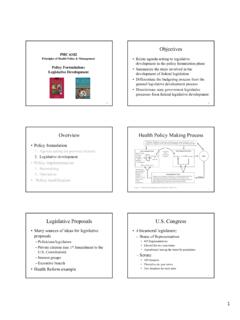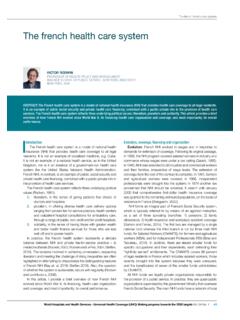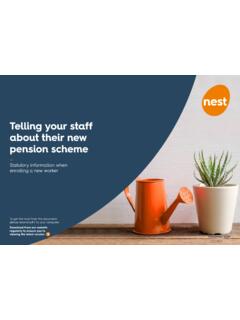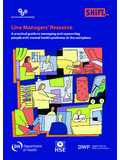Transcription of How to claim - GOV.UK
1 How to claim Personal Independence Payment Easy Read Our reference: PIP2ER 05/21. Contents 1. Introduction Page 4. 2. Making a claim Page 6. Making a claim by 3 telephone Page 9. Questions we ask on 4 the form Page 13. Page 2. Contents After you have sent your 5 form to us Page 15. 6. Other types of support Page 19. Page 3. 1 Introduction Personal Independence Payment is a benefit from the Department for Work and Pensions. It helps with some of the extra costs you have to pay when you have long term ill health or a disability. Personal Independence Payment is sometimes known as PIP. Page 4. Personal Independence Payment can help you be more active and do more on your own. This leaflet tells you how to claim Personal Independence Payment. For more Easy Read leaflets, go to Search for Easy Read Personal Independence Payment.
2 Page 5. 2 Making a claim If you think you can get Personal Independence Payment, you should make a claim . You do this by contacting the Department for Work and Pensions. To make a Personal Independence Payment claim , call us free on 0800 917 2222. Page 6. If you cannot hear or speak on the phone, use Relay UK: 18001 then 0800 328 5644. Relay UK used to be known as Next Generation Text (NGT). If you are deaf and use British Sign Language you may be able to use the Video Relay Service (known as VRS). For more information, go to You can also claim by post. Page 7. To claim by post, you can write us a letter asking for the form. Our address is: Personal Independence Payment New Claims Post Handling Site B. Wolverhampton WV99 1AH. Page 8. 3 Making a claim by telephone If you need support to call us, you can ask: A family member or friend Someone who helps you A carer or support worker.
3 If someone speaks on your behalf, you must be with them. If this is not possible, we may have to send you a claim form to complete instead of claiming by telephone. If you have no-one to help you call us, you should still call anyway. We will support you during your call. Page 9. During the telephone call The telephone call is free from your landline or mobile phone and will last about 15 minutes. During the call we will ask for some personal details, such as: Your National Insurance number Your health or care worker details Your bank details. We may ask questions about your health condition or disability during the call. Page 10. Tell us during the call if you need a form in a format such as braille, large print or audio CD. After the telephone call After the telephone call, we send you a letter and a form called How your disability affects you.
4 We will also send you an information booklet to help you fill in the form. Page 11. It can take up to 2 weeks for the form and information booklet to get to you. Use this time to collect information to support your claim . Send this information to us with your form. For more information on filling in the form, go to Search for Supporting information for Personal Independance Payment. Page 12. 4 Questions we ask on the form The form asks questions about: How well you can do daily activities Whether you can get around on your own or if you need support. Please give as much detail as you can. This will help us understand how your health condition or disability affects you. Use the information booklet to help you fill the form in. Page 13. Citizens Advice have a guide on their website to help you fill the form in.
5 For more information on filling in the form, go to Search for Help with your PIP claim . You must fill in the form and send it to us by the date shown on the letter. This date is in the section that says What we want you to do. You have 1 month to complete your form and send it to us. If you need more time to fill in the form, please let us know. Page 14. 5 After you have sent the form to us Most people will need to have a meeting known as an assessment. We will look at your form and all your supporting information. We will use this information to decide what kind of assessment you need. Page 15. You may not need a meeting (or assessment) if it is clear you can, or cannot, get Personal Independence Payment. If we ask you to have a meeting, you must attend. In the meeting, a health professional will talk to you about your health condition and your day to day needs.
6 Page 16. After the assessment, we will look at all of the information we have and make a decision on your claim . We will then send you a letter. The letter will tell you if you can, or cannot, get Personal Independence Payment. Page 17. If you can get Personal Independence Payment, the letter will tell you the amount you will get. The letter is usually sent to you within 6 weeks of your assessment date. Page 18. 6 Other types of support You may be able to get a benefit called Universal Credit if: You are out of work You are in work and on low earnings. For more information on Universal Credit, go to Search for Easy Read Universal Credit. Universal Credit can also help you with some housing costs. Some people will still need to claim Housing Benefit instead of Universal Credit. For more information, go to Page 19.
7 You may be able to get help with Council Tax. You may be able to get an Access to Work grant. An Access to Work grant can help pay for changes needed in your workplace to help you do your job. For more information on Access to Work, go to Search for Easy Read Access to Work. Page 20. If someone cares for you, they may be able to get Carer's Allowance. For more information on Carer's Allowance, go to If you have money problems, you can contact: Your local Jobcentre Plus office Your local council office Local help and support groups. For more information on Personal Independence Payment, go to For more information on the benefits, you may be able to claim go to To find your local Jobcentre Plus office, go to To find your local council office, or a help and support group, go to For help with money problems, go to Page 21.













